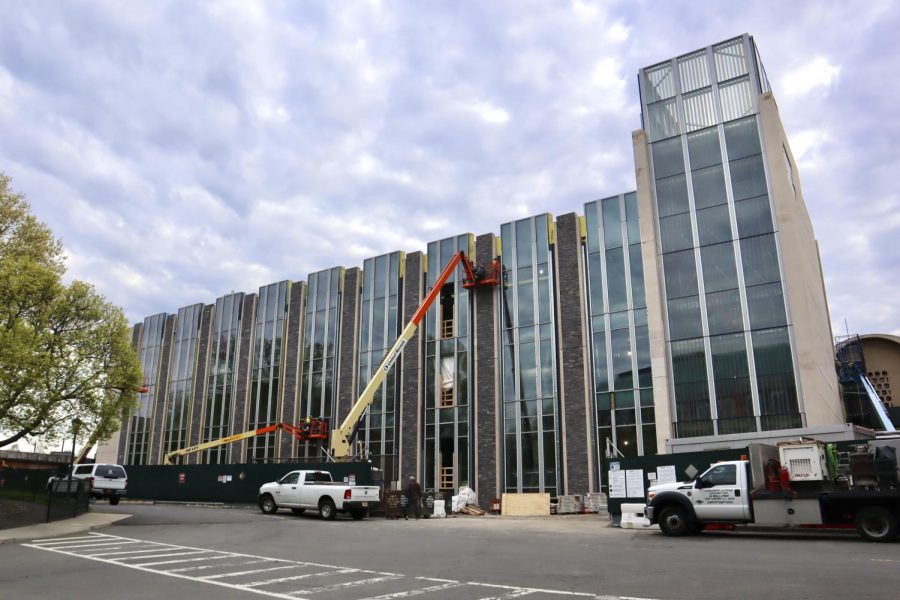McGinley Addition Has Opportunity to Revamp Commuter Experience
When thinking of the hub of Fordham’s student life events and activities, the McGinley Center likely comes to mind. It contains several multi-purpose spaces including the mailroom, fitness center, multiple student organization offices, the career services office, two dining locations and a student lounge intended for commuter students to socialize and do work. Built in 1958, McGinley’s large windows and white arches were meant to pay homage to the Metropolitan Opera House, which neighbors Fordham University’s Lincoln Center campus. However, the university only had 500 on-campus residents at the time of construction as opposed to just under 4,000 today; Students have undoubtedly outgrown the McGinley Center despite the vital student life services within. Essentially every aspect of the space as of right now is outdated and has been lacking in quality for quite some time in anticipation of the new renovations.
In a 2019 interview with Rev. Joseph M. McShane, S.J., president of the university, he admitted that the demand for a better student center is justified. “The building … was aimed at serving a commuter population from the five boroughs — it is now hopelessly out of date,” he said. “It’s not the right size, and it doesn’t have the right mix of facilities. And that’s why we’re pushing this forward.” Specifically, many have criticized that commuter students have been relegated to the basement with an absence of natural light, spotty WiFi and furniture that has been badly in need of a replacement for quite some time. Commuters form about 40% of the student population. Despite this significant percentage, the only spaces for commuters to exclusively gather are too small for the number of students that commute to campus daily.
Luckily, the 75,000 square foot McGinley Center addition will be completed before the fall 2021 semester. Providing commuter students with a more inviting space to socialize in and retreat to has become a priority for the redevelopment.
Alessandra Carino, FCRH ’23, serves as the executive programming coordinator within the Commuter Student Association (CSA) and is looking forward to how the McGinley Center renovations will serve the commuter student population at Fordham. From her experience as a freshman, prior to the pandemic, Carino explained that she frequented the lounge often in between classes or to eat meals while she was on campus for the day. It was also a space where she liked to socialize with other commuter students.
However, Carino acknowledged that it was far from ideal, saying, “[The Student Lounge] is not that comfortable or convenient, especially if you aren’t someone who is coming to campus every day … there is no natural light … yes, it serves its purpose but it’s not ideal.”
She continued to explain that since the space was so limited in its resources and reliability, it could accidentally deter commuter students from becoming involved in campus life. “A lot of commuters are not involved in activities because they don’t have a place to go in between classes or while waiting for club meetings, [so] they just go home,” Carino said. “If they go down to the lounge, it’s too busy, too crowded, too loud.”
Carino is understandably excited for the reveal of the McGinley addition, calling it a “new season of opportunity for commuters and commuter representation.” The importance of places to rest and unwind, just as residents have the flexibility to do in their dorm rooms or at the cafeteria, is an important facet of the new lounge she hopes to see.
“The new lounge will give commuters a place to go and a place to feel at home; it will give us different and new resources that are necessary for us to feel more comfortable and more at home on campus,” added Carino.
There is no reason commuter students should be held back from an enriching college experience simply because they do not reside within Fordham’s gates. Making a space for them has been CSA’s priority and will rightfully be incorporated into the addition. This “new season for commuter visibility,” as Carino so perfectly articulates, is unquestionably deserved and long overdue.
Michela Fahy, FCRH ’23, is a humanitarian studies and English major from Cedar Grove, N.J.










































































































































































































